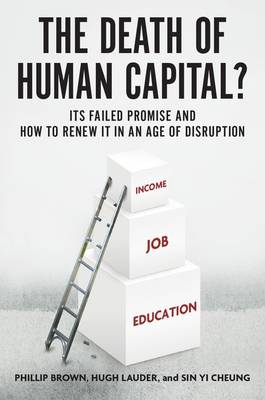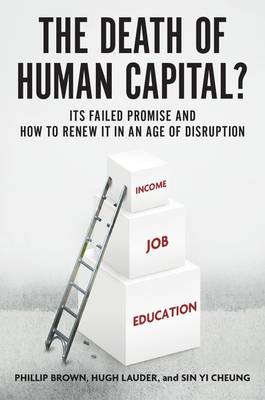
- Afhalen na 1 uur in een winkel met voorraad
- Gratis thuislevering in België vanaf € 30
- Ruim aanbod met 7 miljoen producten
- Afhalen na 1 uur in een winkel met voorraad
- Gratis thuislevering in België vanaf € 30
- Ruim aanbod met 7 miljoen producten
Zoeken
The Death of Human Capital?
Its Failed Promise and How to Renew It in an Age of Disruption
Phillip Brown, Hugh Lauder, Sin Yi Cheung
Hardcover | Engels
€ 125,45
+ 250 punten
Omschrijving
Human capital theory, or the notion that there is a direct relationship between educational investment and individual and national prosperity, has dominated public policy on education and labor for the past fifty years. In The Death of Human Capital?, Phillip Brown, Hugh Lauder, and Sin Yi Cheung argue that the human capital story is one of false promise: investing in learning isn't the road to higher earnings and national prosperity. Rather than abandoning human capital theory, however, the authors redefine human capital in an age of smart machines. They present a new human capital theory that rejects the view that automation and AI will result in the end of waged work, but see the fundamental problem as a lack of quality jobs offering interesting, worthwhile, and rewarding opportunities. A controversial challenge to the reigning ideology, The Death of Human Capital? connects with a growing sense that capitalism is in crisis, felt by students and the wider workforce, shows
what's at stake in the new human capital while offering hope for the future.
what's at stake in the new human capital while offering hope for the future.
Specificaties
Betrokkenen
- Auteur(s):
- Uitgeverij:
Inhoud
- Aantal bladzijden:
- 314
- Taal:
- Engels
Eigenschappen
- Productcode (EAN):
- 9780190644307
- Verschijningsdatum:
- 8/10/2020
- Uitvoering:
- Hardcover
- Formaat:
- Genaaid
- Afmetingen:
- 241 mm x 159 mm
- Gewicht:
- 612 g

Alleen bij Standaard Boekhandel
+ 250 punten op je klantenkaart van Standaard Boekhandel
Beoordelingen
We publiceren alleen reviews die voldoen aan de voorwaarden voor reviews. Bekijk onze voorwaarden voor reviews.











